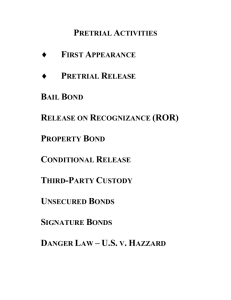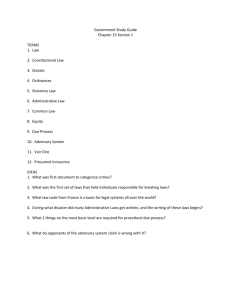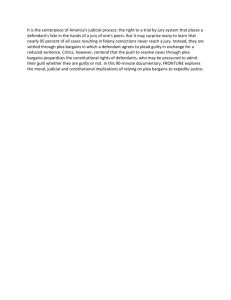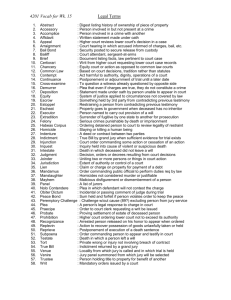Criminal Justice Department - MidAmerica Nazarene University
advertisement
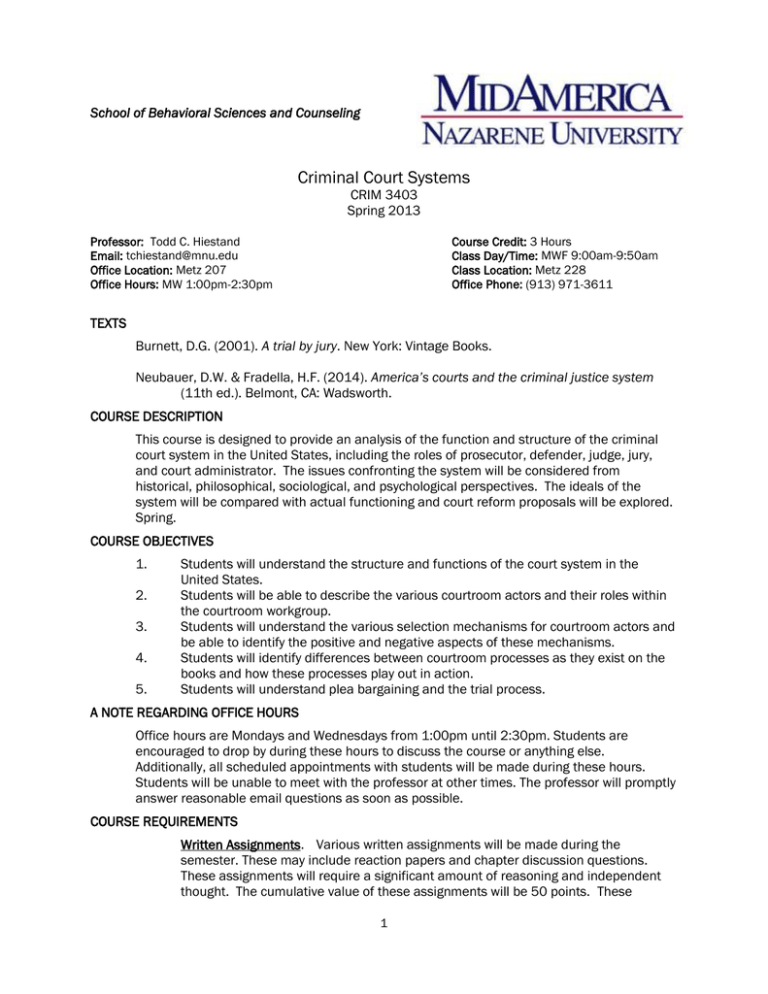
School of Behavioral Sciences and Counseling Criminal Court Systems CRIM 3403 Spring 2013 Professor: Todd C. Hiestand Email: tchiestand@mnu.edu Office Location: Metz 207 Office Hours: MW 1:00pm-2:30pm Course Credit: 3 Hours Class Day/Time: MWF 9:00am-9:50am Class Location: Metz 228 Office Phone: (913) 971-3611 TEXTS Burnett, D.G. (2001). A trial by jury. New York: Vintage Books. Neubauer, D.W. & Fradella, H.F. (2014). America’s courts and the criminal justice system (11th ed.). Belmont, CA: Wadsworth. COURSE DESCRIPTION This course is designed to provide an analysis of the function and structure of the criminal court system in the United States, including the roles of prosecutor, defender, judge, jury, and court administrator. The issues confronting the system will be considered from historical, philosophical, sociological, and psychological perspectives. The ideals of the system will be compared with actual functioning and court reform proposals will be explored. Spring. COURSE OBJECTIVES 1. 2. 3. 4. 5. Students will understand the structure and functions of the court system in the United States. Students will be able to describe the various courtroom actors and their roles within the courtroom workgroup. Students will understand the various selection mechanisms for courtroom actors and be able to identify the positive and negative aspects of these mechanisms. Students will identify differences between courtroom processes as they exist on the books and how these processes play out in action. Students will understand plea bargaining and the trial process. A NOTE REGARDING OFFICE HOURS Office hours are Mondays and Wednesdays from 1:00pm until 2:30pm. Students are encouraged to drop by during these hours to discuss the course or anything else. Additionally, all scheduled appointments with students will be made during these hours. Students will be unable to meet with the professor at other times. The professor will promptly answer reasonable email questions as soon as possible. COURSE REQUIREMENTS Written Assignments. Various written assignments will be made during the semester. These may include reaction papers and chapter discussion questions. These assignments will require a significant amount of reasoning and independent thought. The cumulative value of these assignments will be 50 points. These 1 assignments must be submitted electronically through Moodle. Any assignments emailed to the professor will not be graded. Court-in-Action Exercise. Students will be required to visit a court conducting court business during the semester. Appropriate court business includes, but is not limited to: pre-trial hearings, sentencing, jury trial, bench trial, voir dire, etc. Small claims court and civil cases are not acceptable for this assignment. Students must attend court for a cumulative sixty minute time period. After attending court for the appropriate time period, students will be required to write a more than three less than four page paper discussing the experience. This assignment is due May 3rd at 9am and is worth 100 points. This assignment must be electronically submitted through Moodle. A rubric outlining grading procedure will be provided. Do not procrastinate – make your plans to complete this assignment now! Plea Bargaining Negotiation. Students will act as attorneys in a hypothetical case to participate in a plea bargaining negotiation. Students will also be required to write a negotiation plan, agreement form, and reaction to the experience. The final write up for this negotiation is due on April 15th. This project is worth a total of 50 points. Mock Jury Experience. Students will be required to act as mock jurors for the Business Law II mock trial. The trial is scheduled for 10am to 10:50am on April 22nd, 24th, and 26th. Students will be required to attend all portions of the trial and will enter a verdict. This assignment is worth 50 points. Students will not receive partial credit for partial attendance and you must make appropriate arrangements now to take part in this experience. There will be no regularly scheduled classes on these days. A Trial By Jury Quizzes and Reaction. Throughout the course of the semester we will be reading A Trial By Jury by Burnett. Students will be required to take 4 quizzes over the material worth 20 points each. Students must complete the quiz during the first ten minutes of class on each day a quiz is assigned. If students miss class the day of the quiz they will not be allowed to take the quiz and will receive zero points for that quiz. If students are late to class on the day a quiz is scheduled they will have until 9:10am to complete the quiz. At 9:10am all quizzes from all students will be picked up. Quizzes are tentatively scheduled for February 6th, March 4th, April 3rd and May 1st. If there are any changes to these dates they will be announced in class. At the end of the semester students will turn in a more than two less than three page reaction paper due May 6th. This reaction paper is worth 20 points. Exams. There will be three (3) exams. Each exam will be worth 100 points. Exams will cover material from the text as well as class lectures and discussions. Students are responsible for studying the appropriate chapters as they will also be tested on material not covered in class. For a make-up test, the student must notify the professor, provide a proper reason for the rescheduling, and make arrangements to take the test before the next class period. If the student does not notify the professor prior to the test, or fails to make proper arrangements for a make-up test, the professor has the option of downgrading the test score. Extra credit is not an option. Final. A cumulative final will be administered Friday, May 10th, 8:00am-9:50am. The exam will be worth 125 points. 2 ATTENDANCE POLICY For every unexcused absence, beginning with the fourth, the student’s final grade will be reduced by 15 points. For purposes of this attendance policy only, students who are more than 15 minutes late for a given class period or leave more than 10 minutes early will be counted as absent for that class period. Excused absences consist of serious illness or university sponsored activities. Whether an absence is deemed excused or unexcused rests solely upon the discretion of the professor. Students with perfect attendance will receive a 15 point increase in their final grade. For example, a student with 665 points (B) at the end of the semester with perfect attendance will have his or her grade raised by 15 points. As a result, the student’s grade will be raised from a B to a B+. For purposes of the perfect attendance bonus only, all absences are considered unexcused. GRADING SYSTEM 300 125 100 50 100 50 50 775 Points for Exams (3 x 100) Points for Final Exam Points for Court-in-Action Exercise Points for Written Assignments Points for A Trial By Jury Quizzes and Reaction Points for Mock Jury Experience Plea Bargaining Negotiation Total Points Possible A+ A AB+ B BC+ C CD+ D DF 751 – 775 Points 720 – 750 Points 697 – 719 Points 674 – 696 Points 643 – 673 Points 620 – 642 Points 596 – 619 Points 565 – 595 Points 542 – 564 Points 519 – 541 Points 488 – 518 Points 465 – 487 Points 464 Points or Less LATE ASSIGNMENTS All assignments must be electronically submitted through Moodle at the beginning of class or that assignment will be deemed as late. Each late assignment will be reduced by 10 points per day the assignment is late. For example, if an assignment is due on Monday morning and the student turns in the assignment after the class period begins but before 5pm, that student’s grade on the assignment will be reduced by 10 points. If the student turns the assignment in after 5pm or on the following Tuesday, the grade will be reduced by 20 points. Assignments sent to the professor’s email address will be erased and will not be graded. 3 ACADEMIC INTEGRITY All work is expected to be the student’s own. No credit will be given for assignments or exams that have been plagiarized. Cheating and other dishonest behavior will result in an F for the assignment and will be reported to the Vice President for Academic Affairs. Cheating and other dishonest behavior may result in failure for the course and/or dismissal from the University. CITIZENSHIP Students are expected to display appropriate levels of respect and courtesy. This includes turning off cell phones. If a cell phone rings during class, the student will lose points. Students are not allowed to surf the internet or use a cell phone for text messaging while in class. If a student uses a computer for purposes other than note-taking or engages in text messaging during class, the student will lose points. The professor reserves the right to ask students violating this policy to leave class. If this occurs, the student will be deemed as absent. Criminal Court Systems is an upper division class. Students are therefore substantially responsible for participating in class discussions. This involves engaging the professor and other students in the critical exploration of class concepts as well as the sharing of independent thought. In order to sustain a high level of class discussion it is vitally important that students be prepared to participate by completing readings and assignments on schedule. Failure to attend class with assigned readings completed, participate in class discussions, or use electronic devices for non-class activities will result in a significant loss of points to be determined by the professor. SPECIAL ACCOMMODATIONS Students needing special accommodation must notify the professor within the first two (2) weeks of class. SIGNIFICANT DATES (TENTATIVE) 2/6 2/13 3/4 3/15 4/3 4/8 4/10 4/15 4/22 4/24 4/26 4/29 5/1 5/3 5/6 5/10 A Trial By Jury Quiz 1 (Preliminaries and Chapters 1, 2, and 3) Test One A Trial By Jury Quiz 2 (Chapters 4, 5, and 6) Test Two A Trial By Jury Quiz 3 (Chapters 7 and 8) Plea Bargaining Negotiation Plea Bargaining Negotiation Plea Bargaining Write Up Due Mock Jury Experience 10:00am-10:50am Mock Jury Experience 10:00am-10:50am Mock Jury Experience 10:00am-10:50am Test Three A Trial By Jury Quiz 4 (Chapter 9 and Epilogue) Court-In-Action Due A Trial By Jury Reaction Due Final Exam 8-9:50am CRIMINAL JUSTICE PROGRAM OUTCOMES ASSESSMENT The Court-in-Action Exercise will be used in the outcomes assessment process for the Criminal Justice Program at MidAmerica Nazarene University. This assignment will be used to 4 assess CJ Outcome #3 – Students will describe the major processes at work in the criminal justice system. 5
